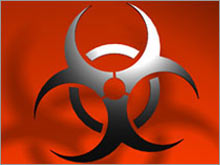 |
 |
| The government is ramping up its drug stockpile to defend against bioterrorist and nuclear attacks. |
|
|
|
NEW YORK (CNN/Money) -
As Americans brace themselves against Hurricane Rita, the second huge hurricane in one month, the government is preparing to spend some serious money on another potential threat: nuclear attack.
As part of Project Bioshield, the Department of Health and Human Services has been allocated $5.6 billion to build up the Strategic National Stockpile with drugs, vaccines and therapies to prepare for the threat of terrorist attacks. About $1 billion of this budget has already been spent on contracts, mostly for anthrax vaccine, but $4.6 billion still remains to prepare against other threats, including radiation poisoning, according to HHS spokesman Mark Wolfson.
On Sept. 30, the HHS plans to publish a draft of a Request for Proposal, seeking input from companies working on therapies for radiation sickness resulting from a nuclear attack. Such an attack would most likely come from a "dirty bomb," where a conventional explosion, disguised in a car or a suitcase, would scatter radioactive material in a major city.
The government is seeking drugs that treat Acute Radiation Syndrome, which causes bone marrow damage, causing the body to succumb to infection and death. Drug makers Hollis-Eden Pharmaceuticals (up $0.21 to $8.61, Research), Amgen (down $0.71 to $83.29, Research) and Akorn, Inc. (down $0.05 to $3.24, Research) are all potential candidates for the government's RFP, according to Wolfson and analysts.
The HHS wouldn't say how much it is planning to spend on radiation therapies, and the size of the Bioshield contracts have varied widely so far. VaxGen Inc. (down $0.40 to $14.60, Research) was awarded the largest bid of $877 million for anthrax vaccine, while Bioport Corp. received a $122 million contract for anthrax vaccine and Fleming & Company was awarded a $6 million contract for potassium iodide to treat radiation sickness in children.
Wolfson said there could be multiple recipients in the next Bioshield contract, or it might just fall to one bidder. "We're not limited to awarding to just a single company," said Wolfson.
Hollis-Eden
Acute Radiation Syndrome breaks down white blood cells and platelets in the bone marrow, eroding the body's ability to fight the bacteria, often leading to death within weeks of radioactive contamination. Hollis-Eden is developing Neumune, an injectable therapy that would rebuild white blood cells and platelets in victims of radiation poisoning.
The company has completed testing in 200 rhesus monkeys for treatment of radiation contamination, which showed an average mortality rate of 12 percent with Neumune, compared to 32 percent without, according to chief executive officer Richard Hollis. Neumune has not yet been submitted to the Food and Drug Administration, but it would not need FDA approval to fill a government contract for Bioshield.
Neumune could be supplied to first responders and private citizens in the form of kits, and could sidestep expensive or unavailable hospital treatments, said Robert Marsella, senior vice president for Hollis-Eden. "The hope is that we could reduce the mortality rate in a nuclear scenario where we could help tens of thousands of victims," said Marsella.
Joseph Pantginis, analyst for Adams Harkness, Inc., believes that an HHS contract to buy Neumune could total $700 million over four years, which would be a significant source of revenue for a company with no products on the market.
Hollis-Eden staffers would not project how big they expected a Bioshield contract to be. "It comes to how many millions of Americans does the government want to protect in a nuclear scenario," said Hollis, the CEO. "I certainly think a radiation threat is more significant than an anthrax threat, that's for sure."
Akorn
Akorn's anti-radiation drugs Ca-DTPA and Zn-DTPA work by purging the body of radioactive elements. The drugs were granted fast-track orphan drug status by the Food and Drug Administration in 2004, said David Moskowitz, analyst for Friedman, Billings, Ramsey. Also, Akorn is the sole bidder on a Bioshield contract that, according to HHS spokesman Wolfson, is separate from the RFP draft that will be announced Sept. 30.
Moskowitz projects that the sole-bid contract could total $10 million to $30 million if the government is seeking enough doses to protect a single region of the U.S., or up to $100 million if the HHS is looking for wider distribution. Akron would pull in additional sales if it is included in the second RFP.
Amgen
Amgen, the largest biotech in the world with $10 billion in 2004 sales, has two drugs that are used to cleanse the body of radioactive elements: Neulasta and Neupogen. These drugs, which combined bring in nearly $3 billion in company sales, are used to reduce infection in chemotherapy patients and could be used to rebuild white blood cells in victims of radiation sickness.
However, Pantginis, the Adams Harkness analyst, said Amgen is handicapped in competing for the RFP bid because its products don't rebuild platelets. "Neupogen/Neulasta only works on white blood cells and therefore only addresses 50 percent of the government's request for properties of the therapeutic," wrote Pantginis in a Sept. 19 report.
Given the negative publicity showing the government's mishandling of Hurricane Katrina, Moskowitz said the feds appear to have their act together with Bioshield. "This type of activity shows that the government is stepping up to get its major cities prepared" for nuclear attack, said Moskowitz.
Akorn and Amgen were not immediately available for comment.
The analysts interviewed for this story do not own stock in the companies mentioned here.
To read about Bioshield contracts for anthrax and smallpox, click here.

|